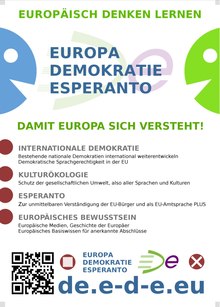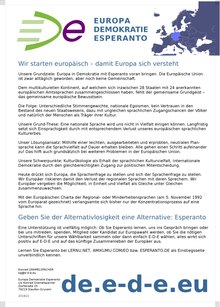Europe - Democracy - Esperanto
| Europe - Democracy - Esperanto | |
|---|---|
|
|
|
| Federal Executive | Konrad Gramelspacher, Steffen Eitner, Georg Hennemann, Hartmut Koblischke |
| founding | 2003 |
| Website | http://ede.eu |
Europe - Democracy - Esperanto (short name: EDE ), in Esperanto Eŭropo - Demokratio - Esperanto, is a European political movement that uses the planned Esperanto language to improve understanding and strengthen democracy in Europe . The French EDE regional association Europe, démocratie, espéranto took part in all European elections since 2004, the German association took part in the 2009 European elections with the status of an “ other political association ” .
history
EDE was founded on October 21, 2003 in Strasbourg as an umbrella organization at European level (EDE Federation).
In the same year a national association was founded in France with its seat in Paris , which is organized there as a political party . There are also some regional EDE associations in France.
The establishment of the German regional association “Europe - Democracy - Esperanto e. V. ”took place on February 1, 2004 in Emden . On July 5, 2008, the association was re-established in Wiesbaden to take part in the 2009 European elections as a “other political association”. Wiesbaden also became the seat of the association.
EDE now has contact addresses in 20 EU countries. EDE also has a section in Brazil.
EDE has been participating in European elections since 2004 - in France in 2004, 2009 and 2014, in Germany in 2009. In 2019, the French national association took part, the German could not collect enough signatures for approval.
Content profile
EDE is committed to understanding, peace and justice . People should treat one another with all-round respect and enter into a free, equal and open dialogue . In order to promote this dialogue across borders, Esperanto should be spread as a neutral and easy-to-learn bridging language. EDE points out that Esperanto is already actively used by people all over the world for international communication. One would like to "advocate for small, goal-oriented steps that contribute to the popularization of Esperanto so that it spreads itself further because of its ever increasing practical value". In the long term, Esperanto should become the first foreign language. The mother tongues , national , regional and minority languages should by no means be suppressed, but rather strengthened and preserved.
EDE supports the process of European unification and advocates the European Union . The German EDE regional association emphasizes that the Lisbon Treaty points “in the right direction”, but that there is a need for further discussion at various points. He also puts the idea up for discussion that EU citizens should also decide whether to accept the treaty by referendum . The French EDE national association is rather critical of the Lisbon Treaty and demands that an assembly elected by the people specifically for this purpose should draw up a new EU constitution , on which EU citizens should then vote in referendums.
EDE is more cautious about issues that do not directly concern language or European policy . In both Germany and France, EDE emphasizes the importance of ecology and sustainability . The German EDE regional association also takes a position on issues such as economic , financial , labor , social and health policy ; however, these statements are deliberately kept general. In general, EDE emphasizes that it is committed to the humanistic ideas of the author of the Esperanto language, Ludwig Zamenhof , and that it is based on the UN Universal Declaration of Human Rights and the Universal Declaration of Language Rights by the Catalan NGO CIEMEN.
structure
EDE is organized as an umbrella organization on a European level (EDE Federation).
In France there is a national association based in Paris , which is organized there as a political party . There are also some regional EDE associations in France. The German national association “Europe - Democracy - Esperanto e. V. ”was re-established as an association in Wiesbaden in order to participate in the 2009 European elections as an“ other political association ”. Participation in Bundestag or Landtag elections is not yet planned, so recognition as a party within the meaning of the Political Parties Act is not yet necessary.
In addition to France and Germany, large groups of EDE supporters have been organized in Hungary, Poland and Great Britain.
EDE has contact addresses in a total of 20 EU countries.
EDE also has a section in Brazil, but only with advisory-observing status, because Brazil is not a member state of the European Union.
Election results
2004
The French EDE national association took part in the 2004 European elections and received 0.15% of the vote. The absolute number of votes was 25,259.
Since the German EDE regional association was only founded shortly before the 2004 European elections, it did not succeed in submitting the necessary 4,000 support signatures to the Federal Returning Officer in time. This only succeeded in the 2009 European elections.
2009
The top candidate for the European elections in Germany in 2009 was Reinhard Selten , Nobel Prize laureate for economics in 1994. In the election, the EDE received 11,722 votes (0.045%). In terms of numbers, Baden-Württemberg had the highest number of votes in a federal state with 2,175, while EDE performed best in terms of percentage with 0.15% in Mecklenburg-Western Pomerania . In France , the EDE received 28,944 votes (0.17%).
2014
In France, EDE received 33,115 votes (0.18%).
2019
In France, EDE received 18,587 votes (0.08%).
criticism
In connection with the admission of EDE to the 2009 European elections in Germany, EDE was occasionally referred to in the press as a “quite bizarre voter association” or mentioned in the same breath as the Pogo party .
But EDE is also not undisputed within the Esperanto movement. In 2004 , the later chairman of the Esperanto World Youth TEJO , Gregor Hinker, pleaded in the association magazine of the German Esperanto Youth not to support EDE because Esperanto is "not suitable as the foundation of a political party" and the diversity of political opinions in the Esperanto movement show "how absurd the idea of a political Esperanto party is".
Individual evidence
- ↑ a b Website of the EDE Federation
- ↑ a b EDE Brazil. September 21, 2018, accessed on September 21, 2018 (Esperanto).
- ^ EDE: EDE Germany for the 2019 European elections . In: Website. EDE Germany, accessed on September 21, 2018 (German).
- ↑ EDE France on the 2019 European elections. EDE France, accessed on September 21, 2018 (French).
- ↑ Konrad Gramelspacher: European elections: informletero No. 4/2019 | Newsletter 4/2019 (March 19, 2019). In: Website of the Federal Association. March 19, 2019, accessed on May 5, 2019 (German, Esperanto).
- ^ Program of the French EDE regional association for the 2009 European elections
- ↑ EDE: EDE structure. In: website. EDE Germany, accessed on December 18, 2018 (German).
- ↑ EDE-HU
- ↑ EDE-PL
- ^ EDE: EDE Great Britain. In: website. Federacio EDE, December 18, 2018, accessed December 18, 2018 (Esperanto).
- ^ Website of the French Ministry of the Interior with the results of the 2004 European elections
- ↑ The Federal Returning Officer ( Memento of the original from April 13, 2009 in the Internet Archive ) Info: The archive link was inserted automatically and has not yet been checked. Please check the original and archive link according to the instructions and then remove this notice.
- ↑ Final result of the 2009 European elections ( memento of the original from 23 September 2015 in the Internet Archive ) Info: The archive link was inserted automatically and has not yet been checked. Please check the original and archive link according to the instructions and then remove this notice.
- ↑ Compare the results table in the French language Wikipedia
- ^ Website of the French Ministry of the Interior with the results of the 2009 European elections
- ^ WAZ Gladbeck, April 17, 2009.
- ^ Welt online, April 2, 2009.
- ↑ kune 4/2004 ( Memento of the original from November 8, 2007 in the Internet Archive ) Info: The archive link was automatically inserted and not yet checked. Please check the original and archive link according to the instructions and then remove this notice. (PDF), p. 18.








